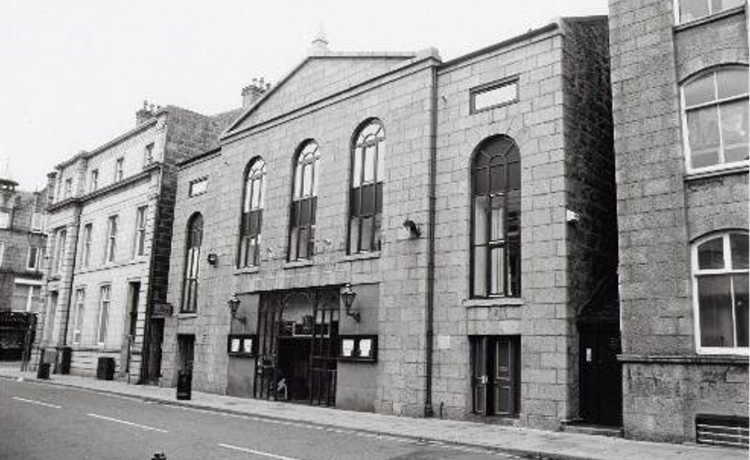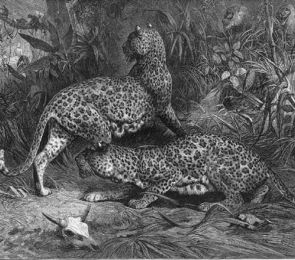“We will protect and enhance the city’s wildlife and biodiversity and preserve the land we manage.”
By Ahayma Dootz.
I had almost lost count of the days we had spent struggling through the overgrown wilderness of Allenvale in search of my ancestor’s tomb when D’oad returned from a scouting trip with alarming news. It seemed that this land was indeed inhabited. A few miles ahead he had spotted signs of a small village or ‘clachan’ nestled in a clearing by a small river which he assumed to be a tributary of the mighty D’ee – possibly the Holb’urn.
“The fowk seem tae be peaceful,” he said. “Ah believe they’re the people ye thocht ye saw back at Sk’inner’s gravestone. Ah heard music.”
We decided to approach cautiously, offering trade goods – ‘tees’, baseball caps, t-shirts from Trumpistan and the like – in exchange for information and fresh supplies. Little did I suspect that this encounter would completely change the nature of my quest!
It was several days later that D’oad and I sat with the headman discussing our plans. It seemed that cousin Walter had also encountered these people. Five years earlier, a man answering Walter’s description had wandered into the village babbling about ‘lost treasures’, a ‘hidden garden’ and a ‘red spire’.
He had been well-equipped but exhausted, and half starved. While he recovered his strength he had told of how, long ago, his own people had once lived in these lands and that while searching for his ‘roots’ he had come across information concerning his family’s lost ‘birthright’. Some fabulous treasure which had mysteriously disappeared causing the time of turmoil that local legends call the ‘Hard Times’.
The headman, G’illie, shook his head.
“Oor aul’ fowk kent a bittie oboot this.” he explained while D’oad translated ( these people were riddled with the ‘doric’.). “Afore oor fowk turnt their backs on a’ they mad gods – K’ooncil, D’ean, Ah’ksef an’ the ithers – we kent fine that the tribute gaithered ower the years had disappeared – aye, that the treasury wis toom!”
He explained that there had always been rumours of how this wealth had somehow been hidden in a secret valley called the ‘Gairdens’ guarded by a tall tower –the ‘red spire’. It appeared that after finding Mary McWalter’s tomb, cousin Walter – always prone to obsession – had gone off in search of these lost riches and that after his arrival here he had pressed on, heading north towards ‘T’oonhoos’.
Despite the corrosion I could make out a shield flanked by two blurred upright figures
I considered my position. Returning home empty-handed had never been an option for me – Walter and I were family after all – but I knew the native bearers would not venture further no matter how many ‘gowfba’s’ I offered. I was delighted, however, when D’oad offered to accompany me.
G’illie allowed us to study old maps and consult with his storytellers then, supplied with fresh provisions and information, D’oad and I prepared to follow the Holb’urn north. As we packed, I asked him why he had decided to continue this uncertain journey. Beckoning me to follow, he walked over to an ancient bench which stood outside G’illie’s hut. Looking closely, I realised that although the seat was made of wood, the frame was cast-iron! D’oad pointed to what seemed to be a coat of arms on the backrest. Despite the corrosion I could make out a shield flanked by two blurred upright figures.
“That is the auld symbol of the ‘Deen,” he said, “Div ye see thae twa craturs either side o’ the shield? They were the ancient guardians o’ the ‘Deen – some wid say they’re only myth, ithers that long, long ago, such things walked this land. There is a legend amongst my people that if ever they are seen again, then the lands o‘ Deen shall be healed – united once again – and returned to their former glory! Noo, ah’ve heard rumours of sightings tae the north. Jist rumours, mind, but if there’s ony hope at a’ then….” , he tailed off.
“But what on earth are they?” I asked.
He told me.
“Aaaaarrrgh!!!” I screeched, “That’s disgusting!” I recoiled from the bench. ”Surely not! Not even here in this benighted land! I mean, medical science…I mean…” words failed me.
D’oad frowned, looking puzzled for a moment; then his face cleared.
“Na, na, na, ya deef gype.” He exclaimed.” Nae lepers, ya bluidy eedjit! Leopards, min, leopards! Muckle big spotty cats, ye ken?” he began to laugh uncontrollably. “Lepers!”
Sheepishly at first, I began to giggle.

